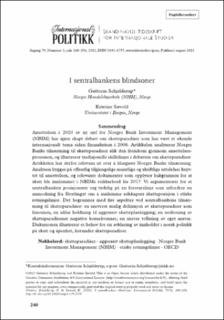I sentralbankens blindsoner
Journal article, Peer reviewed
Published version

Åpne
Permanent lenke
https://hdl.handle.net/11250/2986147Utgivelsesdato
2021Metadata
Vis full innførselSamlinger
Sammendrag
Ansettelsen i 2020 av ny sjef for Norges Bank Investment Management (NBIM) har igjen skapt debatt om skatteparadiser som har vært et økende internasjonalt tema siden finanskrisen i 2008. Artikkelen analyserer Norges Banks tilnærming til skatteparadiser slik den fremkom gjennom ansettelsesprosessen, og illustrerer tradisjonelle skillelinjer i debatten om skatteparadiser. Artikkelen har derfor relevans ut over å klargjøre Norges Banks tilnærming. Analysen bygger på offentlig tilgjengelige muntlige og skriftlige uttalelser knyttet til ansettelsen, og relevante dokumenter som opplyser bakgrunnen for at skatt ble innlemmet i NBIMs etikkarbeid fra 2017. Vi argumenterer for at sentralbanken posisjonerer seg tydelig på en forsvarslinje som utfordrer en anmodning fra Stortinget om å innlemme selskapers skatteposisjon i etiske retningslinjer. Det begrunnes med fire aspekter ved sentralbankens tilnærming til skatteparadiser: en snevrest mulig definisjon av skatteparadiser som fenomen; en uklar holdning til aggressiv skatteplanlegging; en nedtoning av skatteparadisenes negative konsekvenser; en snever tolkning av eget ansvar. Diskusjonen illustrerer et behov for en avklaring av innholdet i norsk politikk på skatt og åpenhet, herunder skatteparadiser. The appointment in 2020 of a new head of the Norges Bank Investment Management (NBIM), has actualized a debate on tax havens, a growing concern following the international financial crisis of 2008. The article analyses the Norwegian central bank’s approach to tax havens as it unfolded throughout the appointment process and illustrates traditional divisions in tax haven debates. The analysis builds on publicly available oral and written statements following the appointment, and relevant documents that inform the background of how tax and transparency became integrated in NBIM’s work on ethics from 2017. The central argument put forward here is that the central bank position represents a traditional defense of tax haven use, in which challenges a request by the Norwegian Parliament to subordinate companies’ tax strategies to ethical guidelines. We show that this is justified with four identified aspects of the central bank’s tax haven approach: a narrow definition of the tax haven phenomenon; an unclear attitude to aggressive tax planning; a downplay of negative consequences of tax havens; a narrow interpretation of its own responsibilities. The discussions illustrate the need to clarify the content and practical management of the Norwegian policy on tax and transparency, including tax havens.
